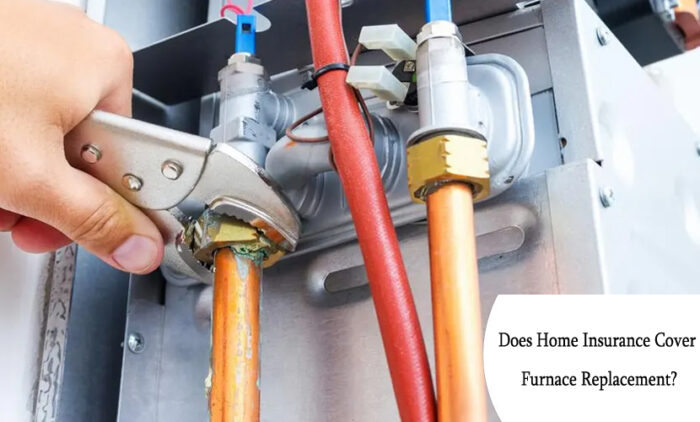Does home insurance cover furnace replacement? Home insurance covers furnace replacement if the damage stems from a covered peril, such as sudden and accidental damage, fire, or vandalism.

However, it’s important to thoroughly review your policy to grasp the specific coverage details and exclusions related to furnace replacement.
But keep in mind that damage resulting from wear and tear, lack of maintenance, or certain natural disasters like earthquakes might not be covered.
To safeguard coverage for furnace replacement, homeowners should diligently maintain their heating systems, maintain records of maintenance and repairs, and promptly address any issues to mitigate potential damage.
Should a furnace breakdown occur, homeowners must promptly contact their insurance provider to initiate a claim and adhere to the required procedures. Providing documentation of the damage, such as photographs, repair estimates, and pertinent receipts, can streamline the claims process.
Understanding the coverage limits, deductible amounts, and any additional endorsements that could impact reimbursement for furnace replacement is advisable. Proactively maintaining your furnace and comprehending your insurance policy can significantly prepare you for a furnace replacement scenario.
When Are Broken Furnaces Not Covered By Homeowners Insurance?
Broken furnaces are not covered by homeowners insurance in scenarios involving:
- Wear and tear.
- Mechanical breakdown.
- Earthquakes
- Natural flooding.
- Sewer line backups.
- Pest damage.
Insurance won’t reimburse for furnace replacements due to:
- Poor maintenance.
- Old age.
- Neglect .
- Damage caused by pests like rodents.
Standard policies exclude coverage for:
- Damage from earthquakes.
- Damage from natural flooding.
- Certain mechanical issues relate to wear and tear.
To ensure coverage for furnace replacement, homeowners should maintain their heating systems properly and be aware of the exclusions in their policies.
Broken Furnaces Typically Covered By Homeowners Insurance?
Sudden and accidental damage: Homeowners insurance can cover furnace replacement if the furnace incurs damage from a burst water supply pipe, explosion, or other sudden incidents.
Freezing: If a furnace freezes up and breaks, homeowners insurance may cover its replacement as long as the home was adequately heated at the time of the loss.
Falling objects: Damage to the furnace caused by falling objects, such as a tree damaging the outdoor condenser, may be covered by the policy.
Other causes of furnace damage: Homeowners insurance can cover furnace damage from perils like fires, severe storms, or any other listed cause in the policy.
What Is The Process For Filing A Home Insurance Claim For Furnace Replacement?
To file a home insurance claim for furnace replacement, homeowners should follow the steps outlined in the search results:
Review Your Policy: Check if the damage to your furnace is covered by your policy. Open peril policies cover damage unless specifically excluded, while named peril policies cover costs only if the cause is listed.
Submit Relevant Forms: Provide proof of damage and the cause when submitting the claim forms. An insurance adjuster will assess eligibility and determine if repair or replacement is necessary.
Understand Coverage: Depending on your policy, insurance may pay for repairs or a new furnace. Replacement value coverage pays for a new furnace, while market value coverage provides a depreciated payment.
Document Damage: Document the damage with photos or videos before removing the furnace. This documentation can strengthen your claim.
Contact Your Insurer: Notify your insurer immediately after the damage occurs. If the loss is covered, file the claim promptly to start the process.
By following these steps, homeowners can navigate the process of filing a home insurance claim for furnace replacement effectively.
Broken Furnace Insurance Claim Tips
To maintain your furnace effectively, consider the following tips from the provided sources:
- Regular Maintenance: Conduct regular maintenance to increase the lifespan of your furnace, protect your investment, and ensure safe operation.
- Thermostat Calibration: Check and calibrate your thermostat to ensure accurate temperature readings and optimize energy usage.
- Air Filter Replacement: Regularly replace or clean the air filter to maintain airflow, prevent strain on the system, and improve indoor air quality.
- Inspect and Clean Vents: Ensure proper airflow by inspecting and cleaning vents and ducts to optimize system efficiency.
- Professional Maintenance: Schedule annual professional maintenance to address critical components, prevent breakdowns, and extend the furnace’s lifespan.
- Check for Unusual Sounds: Pay attention to any unusual sounds coming from your furnace, as they can indicate potential problems that require professional attention.
- Visual Inspection: Before maintenance, visually inspect your furnace for any visible issues like loose wires, corrosion, or wear and tear.
By following these furnace maintenance tips, homeowners can ensure their heating systems operate efficiently, reduce energy costs, and avoid costly repairs.
Frequently Asked Questions
When And How Does Homeowners Insurance Cover Furnace Replacement?
Homeowners insurance covers furnace replacement if the damage is caused by a covered peril like an explosion, a natural disaster, or other specified events. However, reviewing your policy is important to understand the specific scenarios where coverage applies.
How Much Do I Have To Pay If Homeowners Insurance Covers Furnace Replacement?
Homeowners may need to pay a deductible and any costs exceeding the coverage limit when filing a claim for furnace replacement. Understanding these costs and coverage limits is essential before proceeding with a claim.
If Homeowners Insurance Doesn’t Cover Furnace Replacement, What Will?
If standard homeowners insurance does not cover furnace replacement, homeowners can consider purchasing equipment breakdown coverage for protection against mechanical failures or wear and tear not covered by their base policy.



